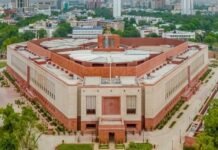NEW DELHI: The Supreme Court has expressed strong displeasure after discovering that High Courts have been denying bail to people incarcerated for long periods. Instead, they instruct trial courts to resolve the cases within a specified deadline.
A two-judge bench of Justices Abhay S. Oka and Augustine George Masih observed, “Every day we notice that in several orders passed by different High Courts while rejecting the bail applications, in a routine manner, the High Courts are fixing a time-bound schedule for the conclusion of the trials. Such directions adversely affect the functioning of the trial courts as in many Trial Courts, there may be older cases of the same category pending.”
The top court made these strong remarks after hearing an appeal filed by one Sangram Sadashiv Suryavanshi, who has been accused of illegally possessing six counterfeit currency notes. He moved SC challenging a Bombay HC order which denied him bail.
The apex court had granted bail to the appellant, Suryavanshi, for offences under Sections 489A (Illegal possessions of counterfeit currency notes) and related sections of 489-B and 489-C read with Section 34 (Common Intention to commit crime) of the IPC (Indian Penal Code) after noting the “well-settled rule that bail is rule and jail is an exception.”
While directing the appellant to cooperate with the trial court for the expeditious conclusion of the trial, the bench stated that it noticed several orders passed by different High Courts which were fixing a time-bound deadline in finishing the trial, but failed to say about granting bail to the accused.
Highlighting that every court had criminal cases pending, the top court noted that these cases required expeditious disposal for several reasons, such as the requirement of the penal statutes, long incarceration, age of the accused, etc.
“Only because someone files a case in our Constitutional Courts, he cannot get out-of-turn hearing. Perhaps after rejecting the prayer for bail, the courts want to give some satisfaction to the accused by fixing a time-bound schedule for trial. Such orders are difficult to implement,” it said.




























